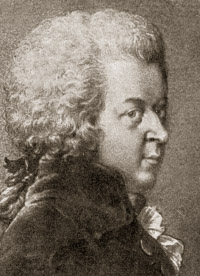|
 Wolfgang Amadeus Mozart
Wolfgang Amadeus Mozart
|
|
|
|
|
Masonic references in Amedeus
|
 |
 |  |
Amadeus was first presented by the National Theatre of Great Britain in December 1979 with Paul Scofield as Salieri and Simon Callow as Mozart. The script was published in London by André Deutsch in 1980. A second version appeared on Broadway and a third version was written for the 1984 movie. After the film, the first significant new stage production of Amadeus played at the Stratford Festival Theatre, Ontario in 1997. The following quotations are taken from the revival of Amadeus that played at the Old Vic Theatre in London in 1998. Peter Shaffer remarks on his rewrite of the end of act two, "Baron van Swieten appears, scandalized at discovering his cherished Masonic secrets exposed in a theatrical vaudeville." "The rejection of Mozart by the Masons (an obviously fictional event, though there were persistent rumors in the ensuing two centuries that some of the Brotherhood had been deeply displeased by the vaudeville and its indiscreet composer) is the final and most lethal injury engineered by Salieri in the play." 1
It is worth noting in passing that this masonic sub-plot was not incorporated into the screenplay. The draft script for the film retained two masonic references. Describing Mozart’s apartment: "on the forte-piano lies Mozart’s Masonic apron, woven with symbols. And the film was to end with "the tremendous Masonic Funeral Music of Mozart."
|
 |
 |
 |
Act 1 scene 4
Salieri: "Baron van Swieten. Prefect of the Imperial library. Ardent Freemason. Yet to find anything funny." [p. 21-22.]
van Swieten: "You're a worthy man, Salieri. You should join our Brotherhood of Masons. We would welcome you warmly."
Salieri: "I would be honored, Baron!"
van Swieten: "If you wish, I could arrange initiation into my lodge."
Salieri: "That would be more than my due."
van Swieten: "Nonsense. We embrace men of talent of all conditions. I may invite young Mozart also —dependent on the impression he makes."
Salieri: "Honor indeed! In those days almost every man of influence in Vienna was a Mason, and the Baron’s lodge by far the most fashionable." [pp. 22-23.]
Act 2 scene 4
van Swieten: "I had assumed, now that you had joined our Brotherhood of Masons, you would choose more elevated themes." [p. 68.]
van Swieten: "He'll make a fine new Brother, won't he Salieri?" [p. 70.]
Act 2 scene 11
Constanze helps Wolfgang off with his coat. He is revealed as wearing a Masonic apron. [p. 88.]
Venticelli 1: "They say he’s written letters to twenty brother Masons."
Salieri : "Really?"
Venticelli 2: "And they're giving him money."
Salieri : "Of course! They would!... I had forgotten the Masons! Naturally they would relieve him—how stupidof me!... There could be no finally starving him with the Masons there to help!" [p. 89.]
Act 2 scene 12
A Masonic Lodge : A huge golden emblem descends, encrusted with Masonic symbols. "... my brother Masons virtually keep me now. ...It is a duty of a Mason to help.... ...Schikander, He’s a new member of this lodge.... ...and a popular piece about brotherly love could celebrate everything we believe as Masons!" [pp. 89-92.]
Act 2 scene 13
Salieri: "Initiation ceremonies. Ceremonies with blindfolds. All rituals copied from the Masons! [p. 92.]
Salieri: "He had put the Masons into it right ennough. Oh yes—but how? He had turned them into a secret order of Priests.
van Swieten: "You have put our rituals into a vulger show!
Mozart: "No, sir."
van Swieten: "They are plain for all to see! And to laugh at!... You have betrayed the Order."
Act 2 scene 14
Mozart: [In horror]. "No!" [p. 100.]
Act 2 scene 16
Mozart: "They say the Masons poison people who offend them!" [p. 105.]
Act 2 scene 18
Salieri cuts his throat and falls backwards into the wheelchair. Mozart’s somber Masonic Funeral Music sounds in the background. [p. 117.]
The lights fade to blackness, as the last four chords of the Masonic Funeral Music of Wolfgang Amadeus Mozart sound through the theatre. [p. 119.]
1.  Amadeus, a play by Peter Shaffer, with an introduction by the director Sir Peter Hall and a new preface by the author. first published in England in 1980 by André Deutsch Limited, in a somewhat different form. The first U.S. edition of this book was published in 1981 by Harper & Row, Publishers, in a somewhat different form. First Perennial edition published 2001. HarperCollinsPublishers. 124 p. pb ISBN : 0-06-093549-9. p. xxx., other pages noted in square brackets. Amadeus, a play by Peter Shaffer, with an introduction by the director Sir Peter Hall and a new preface by the author. first published in England in 1980 by André Deutsch Limited, in a somewhat different form. The first U.S. edition of this book was published in 1981 by Harper & Row, Publishers, in a somewhat different form. First Perennial edition published 2001. HarperCollinsPublishers. 124 p. pb ISBN : 0-06-093549-9. p. xxx., other pages noted in square brackets.
|